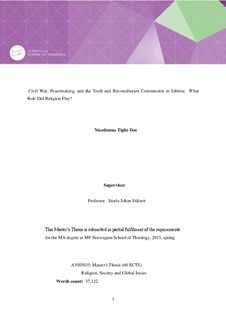Civil War, Peacemaking, and the Truth and Reconciliation Commission in Liberia: What Role Did Religion Play?
Master thesis
Permanent lenke
http://hdl.handle.net/11250/294172Utgivelsesdato
2015-08-03Metadata
Vis full innførselSamlinger
Sammendrag
This thesis seeks to investigate which role Christianity, Islam and the Indigenous religions (Poro and Sande) plays during Liberia’s civil war, the peacemaking process, and during the Truth and Reconciliation Commission’s work. In the study each religious tradition role is thoroughly investigated separately in order to uncover each of these religions’ relation to various rebels’ factions and the government troops during the conflict, as well as their contributions in efforts towards peacemaking, truth and reconciliation. The thesis also discusses the role of these religious traditions collectively in view of theories on religious conflict resolution, and the success and challenges of peacemaking in the Liberian context.
The emphasis is on factors of successful religious peacemaking which other countries’ religious traditions can adopt in their own given context.
The study also accesses and seeks to uncover the impact and effects of the civil war on these religious communities’ physical institutions, their adherents ’beliefs and worldviews from the Liberian perspective. The thesis argues contrary to widespread conceptions that religion did play an important role in perpetuating in and during the conflict itself; I argue that it in this period played an important albeit secondary role, whereas in the various stages of the peace processes and the truth and reconciliation commission’s work it can be seen as playing a primary role. The former and latter above tenets conform the basic argument in the thesis. In chapter four and five I explore “why and how” religion play a secondary role in regard to the civil war, as well as primary factor in resolving the conflict and in the truth and reconciliation commission’s work.
